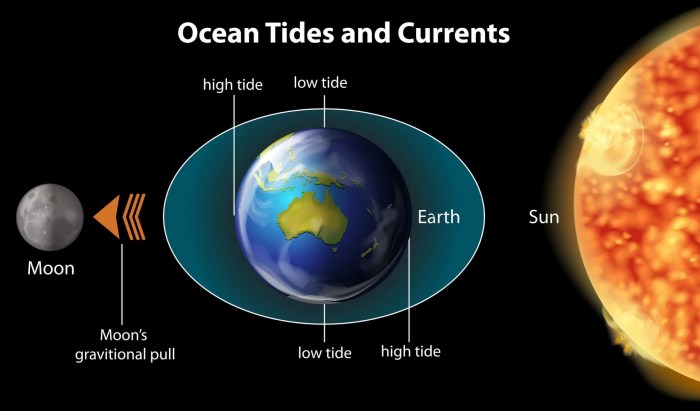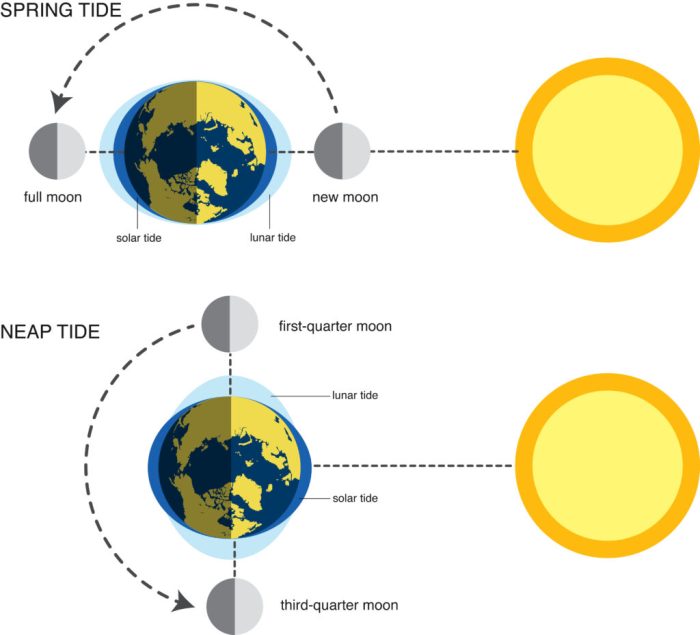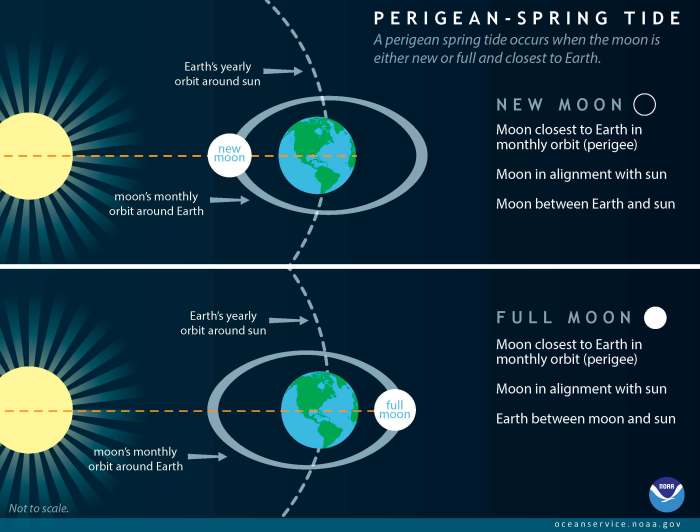Does an eclipse affect the tides? The answer to this question lies in understanding the gravitational pull between the Earth, Moon, and Sun. The Moon’s gravity creates tides on Earth, and solar and lunar eclipses occur when the Moon and Sun align in specific ways.
This Artikel explores the relationship between eclipses and tides, examining the evidence and potential mechanisms involved.
The gravitational forces at play during eclipses are complex, and their impact on tides is a subject of ongoing research. This Artikel will provide an overview of the current understanding of this topic, highlighting the factors that influence tidal patterns and the role that eclipses may play.
Tidal Forces and the Moon

Tides are the rhythmic rise and fall of sea levels caused by the combined gravitational pull of the Moon and Sun on the Earth.
The Moon’s gravity exerts a stronger pull on the side of the Earth facing it, creating a bulge of water on that side. Simultaneously, the opposite side of the Earth also experiences a bulge due to the centrifugal force created by the Earth’s rotation.
These two bulges form high tides.
The Moon’s Gravitational Pull
- The Moon’s gravitational pull is strongest on the side of the Earth facing it, causing a high tide.
- The opposite side of the Earth also experiences a high tide due to the centrifugal force created by the Earth’s rotation.
- The combined effect of these two bulges results in two high tides and two low tides each day.
Solar and Lunar Eclipses

An eclipse is an astronomical event that occurs when an astronomical object is temporarily obscured, either by passing into the shadow of another body or by having another body pass between it and the observer. Solar and lunar eclipses are two distinct types of eclipses that involve the Sun, Moon, and Earth.
Solar Eclipses
A solar eclipse occurs when the Moon passes between the Sun and Earth, and the Moon’s shadow falls on Earth’s surface. Solar eclipses can only occur during a new moon, when the side of the Moon facing Earth is not illuminated by the Sun.
There are three main types of solar eclipses:
- Total solar eclipse:Occurs when the Moon’s umbra (darkest part of its shadow) falls on Earth’s surface. During a total solar eclipse, the Sun is completely blocked out by the Moon, and the sky darkens for a few minutes.
- Partial solar eclipse:Occurs when the Moon’s penumbra (lighter part of its shadow) falls on Earth’s surface. During a partial solar eclipse, only a portion of the Sun is blocked out by the Moon.
- Annular solar eclipse:Occurs when the Moon is at its farthest point from Earth and appears smaller than the Sun. During an annular solar eclipse, the Moon blocks out the center of the Sun, leaving a ring of sunlight visible around the Moon.
The path of the Moon’s shadow during a solar eclipse is called the path of totality. The path of totality is a narrow band on Earth’s surface where a total solar eclipse can be observed.
Lunar Eclipses
A lunar eclipse occurs when Earth passes between the Sun and Moon, and Earth’s shadow falls on the Moon. Lunar eclipses can only occur during a full moon, when the side of the Moon facing Earth is fully illuminated by the Sun.
There are two main types of lunar eclipses:
- Total lunar eclipse:Occurs when the Moon passes through Earth’s umbra. During a total lunar eclipse, the Moon is completely covered by Earth’s shadow, and it turns a reddish-orange color due to the scattering of sunlight by Earth’s atmosphere.
- Partial lunar eclipse:Occurs when the Moon passes through Earth’s penumbra. During a partial lunar eclipse, only a portion of the Moon is covered by Earth’s shadow, and it appears darker than usual.
The path of Earth’s shadow during a lunar eclipse is called the path of umbrality. The path of umbrality is a narrow band on the Moon’s surface where a total lunar eclipse can be observed.
Impact of Eclipses on Tides

Eclipses, both solar and lunar, have been observed and studied for centuries. These celestial events have captured the attention of astronomers, scientists, and the general public alike. One question that has often arisen is whether eclipses have any effect on the tides.
The answer to this question is not entirely straightforward. While there is no direct causal relationship between eclipses and tides, there may be some indirect effects. To understand this, it is important to consider the mechanisms that drive the tides.
Tidal Forces and the Moon
The primary driver of tides is the gravitational pull of the Moon. The Moon’s gravity exerts a force on the Earth’s oceans, causing them to bulge out slightly on the side facing the Moon and on the opposite side of the Earth.
These bulges create high tides.
The Earth’s rotation also plays a role in the tides. As the Earth rotates, different parts of the planet move through the Moon’s gravitational field. This causes the tides to rise and fall twice a day.
Solar and Lunar Eclipses
Eclipses occur when the Moon or the Earth passes between the Sun and the other body. Solar eclipses occur when the Moon passes between the Sun and the Earth, blocking the Sun’s light. Lunar eclipses occur when the Earth passes between the Sun and the Moon, blocking the Sun’s light from reaching the Moon.
Impact of Eclipses on Tides
Eclipses do not have a direct effect on the tides. However, there may be some indirect effects due to the alignment of the Sun, Moon, and Earth during an eclipse.
During a solar eclipse, the Moon is positioned between the Sun and the Earth. This alignment can cause a slight increase in the gravitational pull of the Moon on the Earth’s oceans. This increase in gravitational pull can lead to slightly higher high tides and slightly lower low tides.
During a lunar eclipse, the Earth is positioned between the Sun and the Moon. This alignment can cause a slight decrease in the gravitational pull of the Moon on the Earth’s oceans. This decrease in gravitational pull can lead to slightly lower high tides and slightly higher low tides.
It is important to note that these effects are very small and are unlikely to be noticeable to the casual observer. However, they have been observed and measured by scientists using tide gauges.
Other Factors Affecting Tides: Does An Eclipse Affect The Tides

Besides the gravitational forces exerted by the Moon and the Sun, several other factors can influence the tides. These factors interact with the Moon’s gravity to create the observed tidal patterns, affecting the height and timing of tides.
Earth’s Rotation
The Earth’s rotation on its axis contributes to the generation of tides. As the Earth spins, different parts of its surface move towards and away from the Moon, resulting in changes in the gravitational pull experienced by the oceans. This motion creates two tidal bulges: one facing the Moon and the other on the opposite side of the Earth.
Wind and Ocean Currents, Does an eclipse affect the tides
Wind and ocean currents can also impact the tides. Strong winds blowing over the ocean’s surface can push water towards the shore, leading to higher tides. Conversely, winds blowing away from the shore can result in lower tides. Similarly, ocean currents can transport water masses, influencing the height and timing of tides in specific regions.
Shape of Coastlines and Ocean Basins
The shape of coastlines and ocean basins plays a role in modifying tidal patterns. Bays and estuaries can amplify tidal ranges, while narrow straits and shallow waters can restrict tidal flow, leading to smaller tidal amplitudes.
Resonance and Amplification
In certain coastal areas, the natural frequency of the ocean basin resonates with the tidal forcing from the Moon and the Sun. This resonance can amplify tidal ranges, resulting in extremely high tides known as spring tides. Conversely, during neap tides, the natural frequency of the basin is out of sync with the tidal forcing, leading to reduced tidal amplitudes.
Query Resolution
Do eclipses cause high tides?
No, eclipses do not directly cause high tides. Tides are primarily caused by the gravitational pull of the Moon and Sun on the Earth’s oceans.
Can eclipses affect the timing of tides?
Yes, eclipses can influence the timing of tides. During a solar eclipse, the Moon’s shadow blocks the Sun’s gravity, which can slightly delay the high tide.
Do all eclipses affect the tides?
No, not all eclipses affect the tides. Only solar eclipses that occur during a new moon can potentially influence the tides.